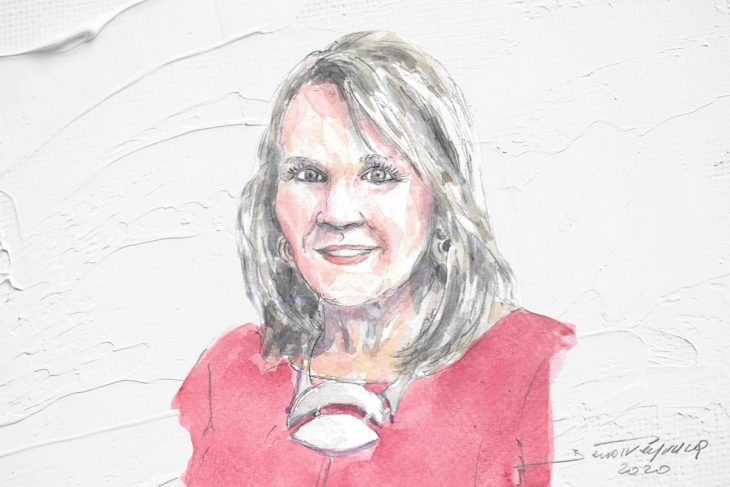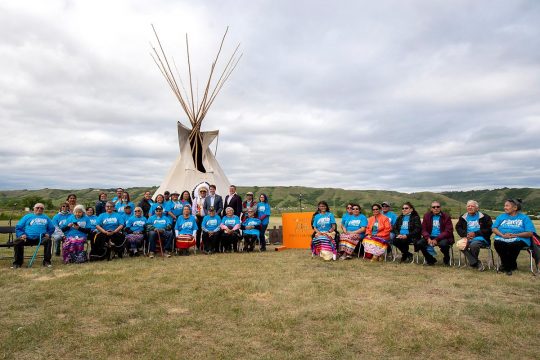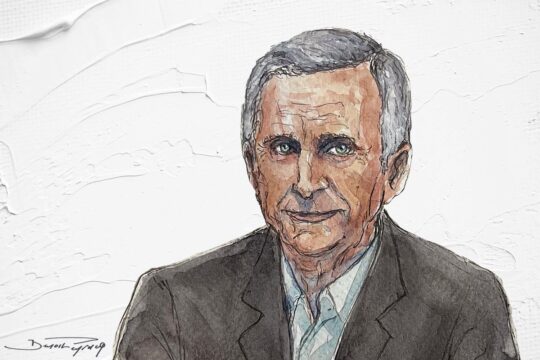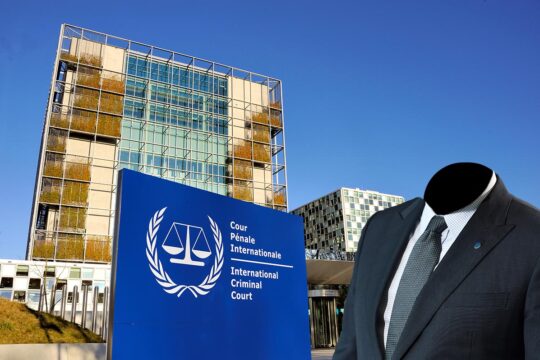JUSTICEINFO.NET IN-DEPTH INTERVIEWS
Marie Wilson
Former Commissioner of the Truth and Reconciliation Commission of Canada
The Canadian government has just put residential schools on the official list of national historic events. From 1881 to 1996, more than 150,000 Aboriginal youth were forcibly removed from their families to be sent to "kill the Indian in the child", as the saying goes. Today’s recognition was one of 94 calls for action in the final report of the Truth and Reconciliation Commission, which concluded in 2015 that "cultural genocide" occurred. Five years later, one of the three commissioners, Marie Wilson, looks back on the process and assesses its impact.
JUSTICEINFO.NET: What was different about this Truth and Reconciliation Commission (TRC) in the global landscape of transitional justice?
MARIE WILSON: First of all, for the first time in the world there was a Truth and Reconciliation Commission in a so-called developed country, so it was historic. Second, again for the first time ever, a commission was dealing with the damage experienced primarily by children, and children of a particular ethnicity. Unlike elsewhere, it was not taking place in a military or war context, over a shorter period of time. It dealt with violence that took place over more than 130 years. Furthermore, it dealt with a situation that was legally established, with laws that created the residential schools whose abuse was committed with the support of several successive governments. Finally, for the first time, a commission was created as a result of the actions and pressures of survivors, the victims of the residential schools, in the courts where the government and the churches were the accused. The Truth and Reconciliation Commission was completely independent, which was crucial for our work, and compared to others around the world, its purpose was not political but was really about healing and claiming the rights of victims. It was a very extraordinary commission.
We kept repeating that this commission was about Canadian history, not Aboriginal history, and that it was Canadian laws that had imposed residential schools.
How did the work of the Commission go?
As it had been taken to court, our commission was "post-judicial". Compared to South Africa, for example, we were not allowed to summon witnesses, nor to award financial damages, etc. It was completely voluntary: the residents, who had requested this commission, could come forward as they wished to share their experiences and educate the general Canadian public about the true history of Canada. And that is what happened. We had three main goals, which corresponded to the mandate: to research, document and preserve for the future the history of residential schools in Canada; to educate the general public; and, finally, to inspire reconciliation. Much effort was therefore put into informing the media. For example, the events were public, including through live webcasts and recordings. We invited everyone, not just Aboriginal people, to come, and we kept repeating that this commission was about Canadian history, not Aboriginal history, and that it was Canadian laws that had imposed residential schools. The challenge was really to get people interested. In the beginning, at major national events, about 10% of those present were non-Aboriginal. At the last of the major events, 60% were. And in our final report and calls for action, we did not strictly target the federal government.
These calls for action were broad, detailed, and addressed both the government and the public. Why?
There is no recipe for reconciliation. Expectations for reconciliation varied widely among former residents. Some wanted a political response - to have nation-to-nation relations with Canada, for example. For others, the question of language was crucial - being able to speak it so that it could be passed on. Others had broader goals: access to jobs and better education… Our mandate was very directive: to establish a research centre, to organise events in the communities but without specifying how many, to educate the general public but without telling us how, to inspire ongoing reconciliation. Finally, in the mandate, it was mentioned that reconciliation should be an individual and collective process involving not only the residents and their families but also the government, the Church, those who worked there and the Canadian public at large.
Five years later, what do you see?
I see that there has been a lot of movement and attempts to act, especially at the level of individuals and non-governmental organisations. But on the systemic issues at the level of governments and large institutions, it is much, much more difficult. Changes of people within organisations are going to be necessary for the situation to really change.
So this is a mixed picture?
Absolutely. And the important point, as I've said many times, is the Calls for Action 53 to 56, which deal with the creation of a National Reconciliation Council, which is intended to monitor whether all the Calls for Action have been put in place, but also to report annually so that the Canadian people can know what the government has done, whether progress is being made or whether the situation is getting worse. The aim is not to blame or point fingers, but to take stock, identify successes and critical situations, learn from what works and what doesn't and see if it can be applied elsewhere, dig deeper to understand what is getting worse and what urgent responses are needed. And yet, after all this time, this National Reconciliation Council still does not exist. An interim committee responsible for proposing the legislative context of this Council has indeed been set up. Its report was submitted almost two years ago, and since then nothing. That is why I am very, very disappointed. This Council is very important, it is a question of human rights and justice.
One certainty is that the statistics on Aboriginal people in prisons, in the justice system, are getting worse. The same is true for young children who are being taken from their homes and put into social services.
What are the issues that have not really made progress in the last five years?
It is difficult to say precisely because, without this Council that I have just mentioned, we cannot know. Canada is very big. However, one certainty is that the statistics on Aboriginal people in prisons, in the justice system, are getting worse. The same is true for young children who are being taken from their homes and put into social services; rates are increasing almost everywhere in Canada and are far, far above - 10 to 15 times - their corresponding proportion of the population.
And let's not forget the issue of Aboriginal youth suicides. Elsewhere, it would be considered an emergency crisis, but here in Canada, it is as if it were nothing. The rate is appalling. I just found out that in one community there were 16 overdose deaths in the space of six weeks. And one wonders: if it were in a southern city with a predominantly white population, would we have the same silent response or would we have an urgent response and an immediate intervention?
Residential schools have caused long-term damage that cannot be repaired in five short years.
There is also the question of services, of access to drinking water. While it has improved, not all communities still have drinking water. We are not talking about reconciliation but about basic means of living. I note that sometimes governments would present as a gesture of reconciliation providing a service that is taken for granted by other citizens.
Residential schools have caused long-term damage that cannot be repaired in five short years. Not everything will be resolved in my lifetime, but our work has engaged and inspired many people and young people who continue in their own way, in universities, in their communities, in their private projects and in their associations, in some companies and even at some levels of government. There are very good examples of people who are making efforts to see themselves differently and to get to know each other, when they have been living together for 150 years and have not even known each other each other as neighbours.
If we look at what people are saying in the Black Lives Matter movement, it is almost identical to what Aboriginal people said publicly at the TRC.
Has this commission created a dynamic at the global level?
Other commissions of this kind have since been set up, and I think that this is partly due to the fact that our work and the Commission got to be known through certain UN forums. We wanted other countries to pay more attention. Thanks to social networks, people paid attention and the live webcasts of our public hearings were very visible. People from 65 to 70 countries were watching our sessions.
I have been invited to participate in workshops three times in Australia, New Zealand, France, Denmark, Norway, Finland and the United States. Each time, the question that came up was: how could you have a Truth and Reconciliation Commission in Canada? What lessons have you learned, how do you go about making an impact? I always tell them that it is far too early to say that Canada has had great success with the Commission. I am proud of the way we have conducted it. Those who participated indicated that just by sharing their experiences, their stories, by freeing themselves of their burdens, they felt relieved and better equipped to continue the healing work. But the impact will only be known in the long term, it will take years before we know if there has really been any systemic change.
If we look at what people are saying in the Black Lives Matter movement, it is almost identical to what Aboriginal people said publicly at the TRC. This underscores how systemic things are for everyone who is left out. The difference for Aboriginal people in Canada is that they have special rights recognized in Canada's Constitution, which is not the case for other people of colour. In section 35 of the Constitution, the First Peoples of Canada have special rights because for them, Canada is their ancestral territory and no one else can claim this in Canada [the Constitution Act, 1982 provides protection for Aboriginal and treaty rights]. But the themes of displacement, lack of opportunity, lack of access, racism, these are themes that come back and back again, and it will take time to rectify the situation.
I often point out in other countries that it is not about asking your government to set up a commission, unless it is guaranteed that it will let the TRC go ahead and not get involved, which is not often the case. Our Commission was a court-imposed obligation - it was not Canada's good will! Canada didn't want it, but since there were 80,000 survivors in the [victims'] class action, it would have taken decades to settle it individually in court. So a collective agreement was reached [in the form of a Settlement Agreement, editor's note]. It was not a government commission, but a commission for which the government had to provide the funds as financial restitution to the residents who fought for the TRC as the most important aspect of the settlement. It was not for the lousy money they received, but rather an opportunity to explain what they had experienced and to educate the general public about Canadian history.
The starting point was not the same as in other countries. The advantages and limitations of this approach must be considered. For example, in our case, governments and churches were required to release thousands of documents from their archives to the Commission. Except that, at one point, they resisted because they did not want to hand over everything, they wanted to retain the worst elements of what had happened. We had to go back to the Federal Court of Canada - we had that power - and the court agreed with us: the government and the churches had to give us any relevant document and not just what they wanted to give us.
You also have to be aware that when a commission is created by the government, it may become less important to the next government if there is a political change. The process for choosing commissioners can also be much more political. Throughout the world, we have seen many variations of this reality. A government can also, while pretending to act, stretch time, offer distraction and do little, rather than correct an unacceptable reality in society.
What kind of TRC would therefore allow for real awareness?
It all depends. If the Commission goes behind closed doors, nothing changes in the short term. If it is open to the general public, it may change. For us, the most important impact was to listen to those voices never heard before, that they be at the centre of the conversation, that these people could teach us and correct our societal ignorance, and that our collective consciousness be challenged: would this be acceptable to us? We really wanted to create a space for voices to be heard. This is the most delicate work, because it has to be done in a flexible, healthy and respectful way, without creating divisions by saying "these are the people who [have suffered] and these are the guilty ones". We have never talked about guilt because it prevents dialogue.
We have not been taught to remain silent and listen to the other, the person who has never spoken, who never has a space in public debate and who has a lot to teach us.
Is this a basis for moving towards reconciliation?
Yes, because we tend not to listen. Rather, we tend to compete for the best answer. We have not been taught to remain silent and listen to the other, the person who has never spoken, who never has a space in public debate and who has a lot to teach us. I was overwhelmed by the poetry, by what they told with great generosity. There was so much beauty and humility. It wasn't filled with resentment, violence, anger... I expected much more of that, I must confess. There was some from time to time, but for the most part, the tone was really respectful, in introspection, with the aim of wanting to heal and also of wanting to repair relationships within one's own family as well as in communities more generally.
What form of reconciliation did the Commission enable?
Many told us that reconciliation begins with themselves. This is because people grew up believing that they were worthless, that they would not achieve anything, that they were "little savages, dirty little people" - especially the younger ones who took it for granted. Reconciliation means first of all forgiving each other for believing these things about them, and now reclaiming an identity of self-respect and self-care. That's why I said that the residents did not define reconciliation narrowly. They conceived it in many ways. We have to keep trying.
The key to a commission is flexibility.
In your opinion, does Canada offer a model for a truth commission?
I don't call it a model because the circumstances are never the same. I don't presume to know what works in one context compared to another. I can tell you that we started out in good faith with a promise to adapt our approach as events unfolded and as we learned. Since there was no model for us, we created something and made adjustments as we went along. Flexibility is very important to make people feel comfortable and secure. We must not forget that at the heart of our work are the survivors, the residents, those who have filed complaints. The key to a commission is flexibility. Another extremely important element is the presence of health support, to avoid emotional or mental crises. Those handling such support are not only trained in the western system but also have traditional and cultural knowledge, such as traditional healers. The health team is an example of what is possible when you work in a spirit of reconciliation, where you take the wisdom and assets of one culture and marry them with the assets and knowledge of another culture, where you allow another way of seeing for the good of all. Each commission must invent itself.
Interviewed by Marie-Laure Josselin, correspondence from Montreal (Canada).
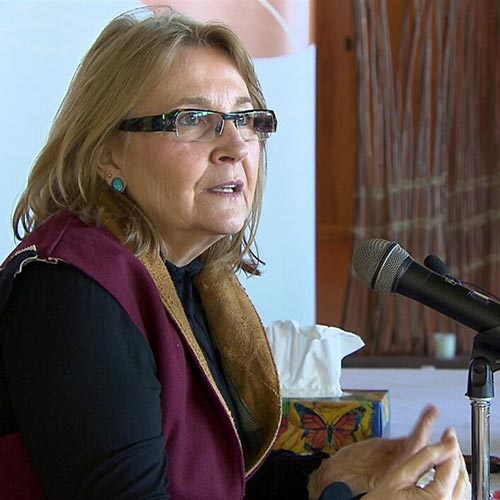
MARIE WILSON
Marie Wilson served as one of three commissioners of the Truth and Reconciliation Commission of Canada (TRC). As a journalist, she spent over 35 years working for the Canadian Broadcasting Corporation. She is a professor at McGill University. As TRC commissioner, she worked for over six years documenting the history and lasting impacts of the Canadian Indian residential school system.


